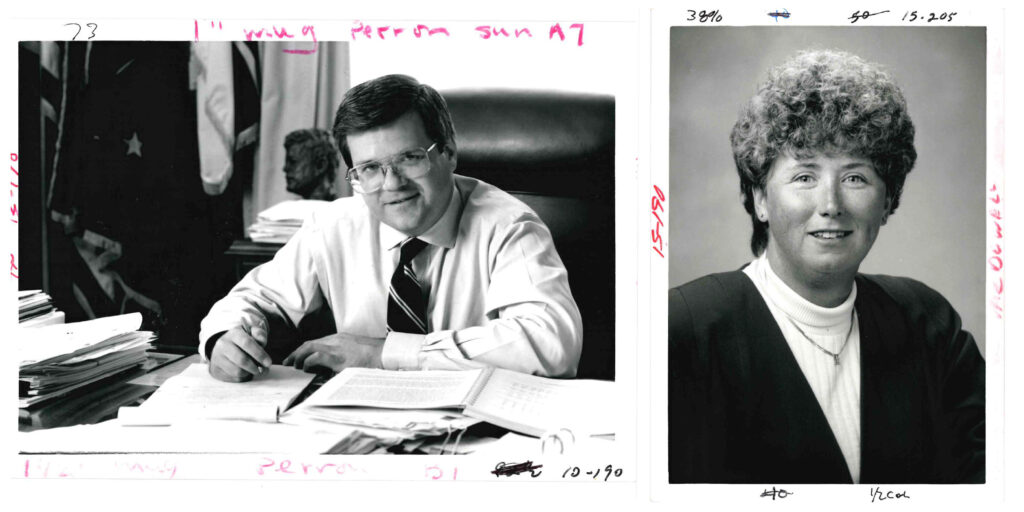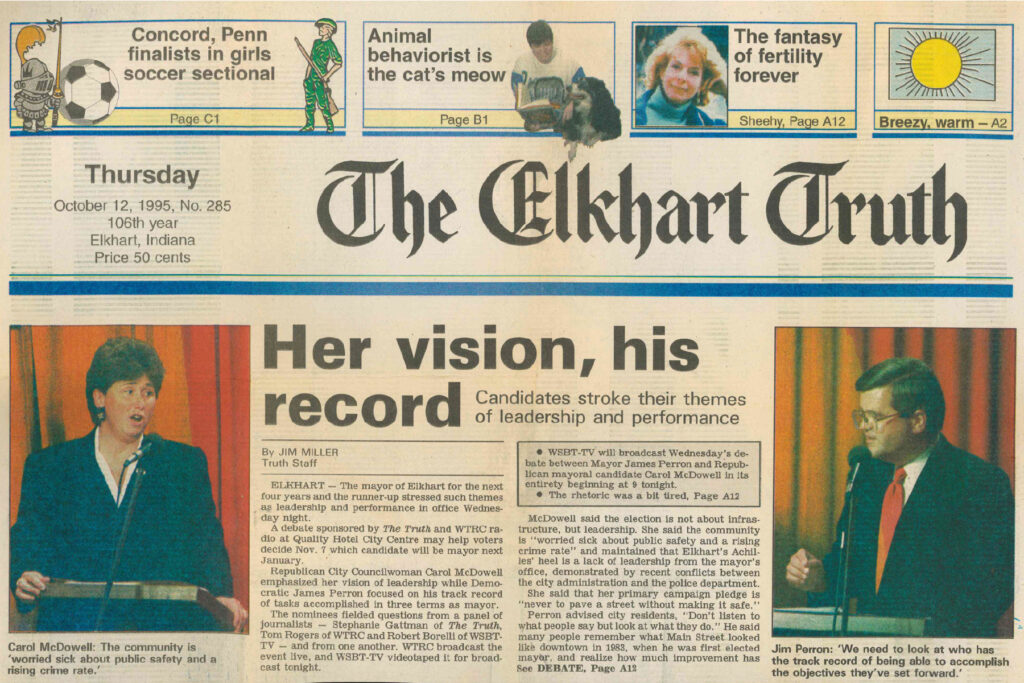A controversial incumbent. Voters on edge. Contested election results.
Just about a year before the 1995 election, Art Decio offered his observations on the difficulties faced by those in public service.
“‘Unfortunately … achievements don’t always command our attention,’” Decio remarked to the Citizens for Promoting Continued Progress, as recounted by Ron Davis in The Elkhart Truth’s Point of View column. “‘They often are obscured by negativism, clouded by controversy, covered up by continued criticism that is as unfair as it is unfounded.
“‘We no longer seem able to celebrate good people doing their best to do good things. We no longer appear to have the good sense to applaud the leadership that is making our community a better place for all of its people.’”
The chairman of Skyline Corp. made his remarks with Elkhart Mayor Jim Perron sitting nearby. Preparing to run for a fourth term in office, Perron’s list of accomplishments was as long as the roll of names opposing his policies and politics.

“I am cognizant of the fact that there are those who will say perhaps it is time for a change,” the Democrat mayor said Feb. 16, 1995, in launching his re-election campaign. “It is this point that I perhaps pondered more than any other before making this all-important decision concerning the future of this city and my own life.”
Perron went on that day to discuss his knowledge of the office, his accomplishments while elected, and his plans for another four years on the job. The challenge, however, was clear.
Carol McDowell, the Republican Party’s nominee, opened her bid for the city’s top job by criticizing Perron for “arrogant leadership” and “clandestine management.” The businesswoman and mother of two was serving on the city council, and said she would not allow “the voice of the people to be stifled by a rubber-stamp government.”
The race for mayor was on. For many, the first Tuesday in November couldn’t come soon enough. When that day arrived, though, the election didn’t come to an end.
‘Inconceivable’
The AM radio in the Winchester Mansion kitchen crackled with the final numbers on the night of Nov. 7.
Perron 5,017 votes. McDowell 4,859.
McDowell had held a 138-vote lead with just a handful of precincts to be counted. Two of those locations, arriving from the south side of the city, delivered for Perron – a 511-73 vote split, an 87.5 percent take.
According to Truth reports from the GOP gathering, the president of the Fraternal Order of Police “uttered ‘inconceivable’ moments after learning the outcome.”
“There are dozens of officers crying in there right now,” Davidson said.
The city administration’s troubled relationship with its police department had become a signature issue in the campaign – quite literally, in one case. The authorship of a dubious 1994 letter to the editor was the subject of a defamation lawsuit Davidson filed against Perron.
The community was on edge with concerns about racial justice. In May 1995, a 22-year-old Black man was shot five times and killed by an officer. Amid demonstrations, a grand jury returned no indictment of the White officer.

For years, McDowell had consistently called for hiring more officers, and had won supporters inside the department with her work during union contract negotiations. Perron, who had had four police chiefs in 11 years, couldn’t achieve the same success with law enforcement as he did with his public works and neighborhood investments.
“The solution (with police) has eluded him,” The Truth wrote in its November endorsement of McDowell. “Perron … is bogged down in recrimination and putting blame on others. He looks back defensively. McDowell … has the forward energy. She has a businesslike way of looking at the pros and cons of a situation. She shows a sense of humor and ability to admit mistakes.”
While officers were shaken by the vote totals at the McDowell event, Police Chief Dennis Bechtel shared a different view outside the Democrats’ victory party at the VFW Post on Sixth Street. The department “better start liking it (the election outcome),” he told a reporter.
The votes had been counted. But police officers’ involvement on behalf of McDowell campaign likely did not end on Election Night.
The deep divide
Two weeks before the election, Perron told the Kiwanis Club he longed to return to the goodwill he said he felt even as recently as the late 1980s. “We always had Elkhart first in mind” then, Perron said, adding the city was “almost a 50-50 split” between the parties.
The votes tallied confirmed Perron’s thoughts. The margin was 50.8 percent Democrat and 49.2 percent Republican. The new council would be seated with a 5-4 GOP majority.
The political divide was narrow and deep.
“Blame and partisanship must be put aside now,” The Truth editorial board wrote, “and attention must turn to building cooperation for the good of Elkhart and the whole Elkhart community.”
That call went unanswered. Just 36 hours after the vote totals were known, Truth editors had to make space under the obituaries on page B3 for late breaking news under the headline, “McDowell may contest vote result.”
Within days, about 100 Republican supporters were attempting to find out the details of how residents cast their mailed ballots. They questioned the validity of more than 400 absentee votes – one-quarter of those originating from two southside voting precincts. They alleged Perron supporters tainted the entire process by conducting themselves improperly and exerting undue influence on voters.
Dan Holtz, the city’s GOP chairman, said Republicans were “using legitimate means to look into irregularities.” Because of the city neighborhoods under inspection and what he personally had learned from voters, Councilman Arvis Dawson said it was a case of racism.
The Truth reported, “Dawson heard from at least six elderly African Americans constituents who say a current and former police officer approached them at their homes asking about the votes they cast in Tuesday’s election. Voters recognized the men, who did not identify themselves as police. Dawson said the voters are being asked who they voted for, who mailed their absentee ballots and in some cases, they are being accused of voting twice.”
Holtz countered, “We are being extremely careful to (e)nsure that whatever facts we gather will be gathered constitutionally and be above reproach.” He stressed to the reporter if any police were participating, they were doing so off duty and as private citizens.
And on the issue of prejudice, McDowell told a Truth reporter, “Is it race just if they say it’s race? It (racism) isn’t happening. Why are they claiming it is? I really don’t understand.”
‘Voters deserve to know’
With Thanksgiving approaching, Elkhart County prosecutor Mike Cosentino had requested the Indiana State Police investigate possible fraud. Circuit Court Judge Gene Duffin met with attorneys from both sides and announced he would decide Dec. 12 whether a recount was necessary.
The Truth editorial board wrote Dec. 1, “Something more fundamental than politics is at stake here. The validity of the ballot process has been called into question. That’s a question which must be answered by facts, not feelings. Voters deserve to know what happens to their ballots.”
It was becoming clear the Perron campaign had executed a strategy to encourage mail-in absentee voting. What happened in those homes as people voted was up for debate. Voters called as witnesses before the recount commission said Democrat workers were present but no influence was felt. All said they signed and sealed the ballots on their own.
Ben Barnes, one of the Democrats working on behalf of the Perron campaign, told a Truth reporter, “My integrity and credibility have been insulted. I’ve lived here 63 years and I’ve never seen anything like this. We told people to get out and vote. We fought for this.”
Recount commissioner Steve Bowers, a Republican, said the idea of Democrat supporters standing by while residents voted at home caused the process to be “inherently tainted.” The commission, he said, needed “to send a clear message to both parties” about conducting elections properly.
John Gildea, the lone Democrat on the three-person commission, argued, “Disregarding the convictions of those voters is nothing short of disenfranchising them.” Republican Harmon “Hap” Williams said no evidence of undue influence had been presented and mail-in ballots should be allowed in the final total. And Bowers, in the end, noted there was “simply inadequate evidence to sustain a fraud claim.”
The commission confirmed Perron’s victory, and the final margin had increased to 156 votes. McDowell conceded and said she would end all legal challenges.
The calendar showed Dec. 19 – exactly six weeks after Election Day – and the election finally was over.
Epilogue
Perron, who notably was both the youngest person elected mayor in Elkhart’s history and also its longest serving mayor, lost his bid for a fifth term in 1999. His vote total was 20 percent less than the support he received in the ’95 election.
McDowell chose not to seek the mayor’s office again. Instead, she has mentored many successful candidates, has served as a delegate to the Republican National Convention, and remains active on local issues.